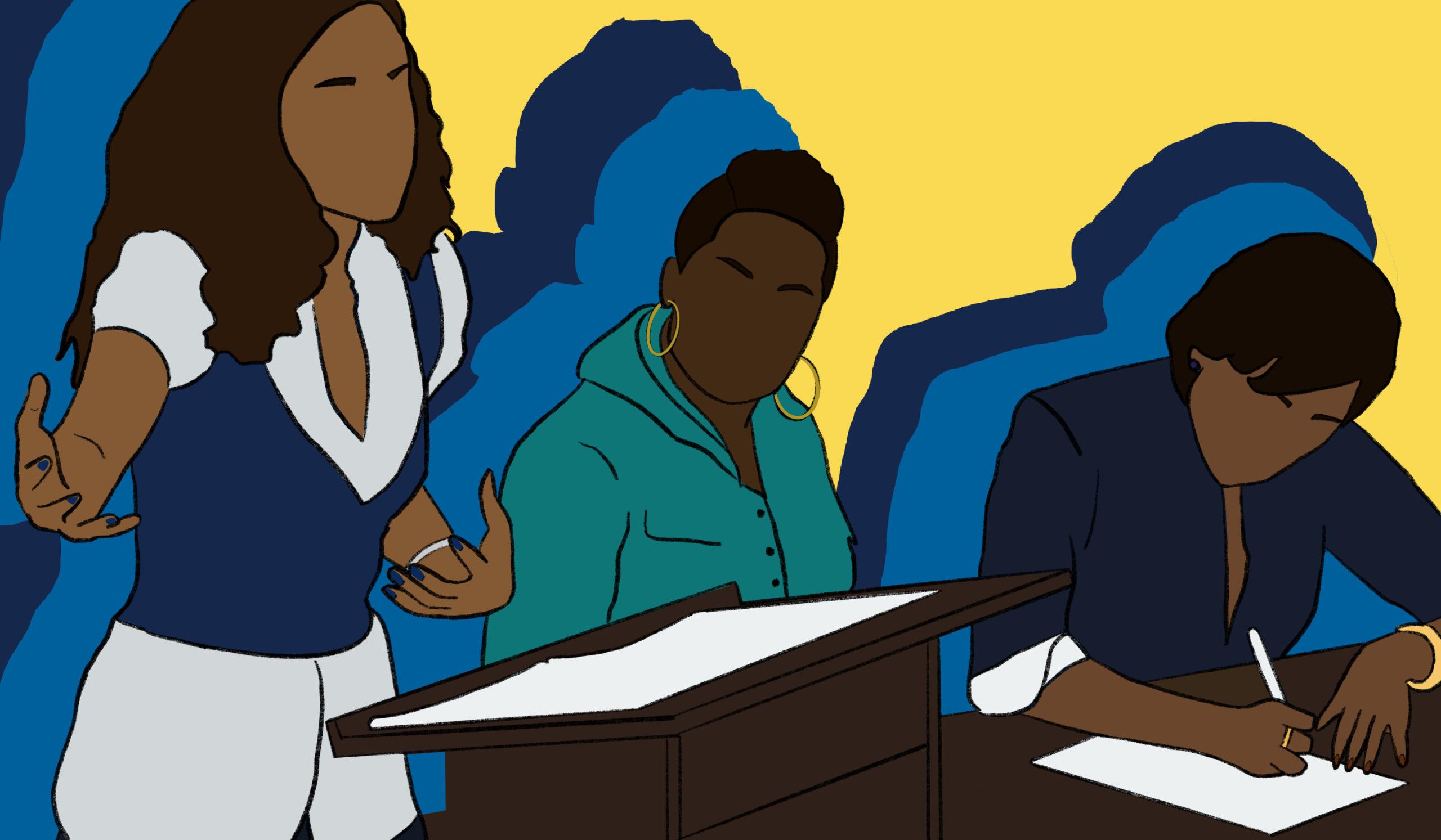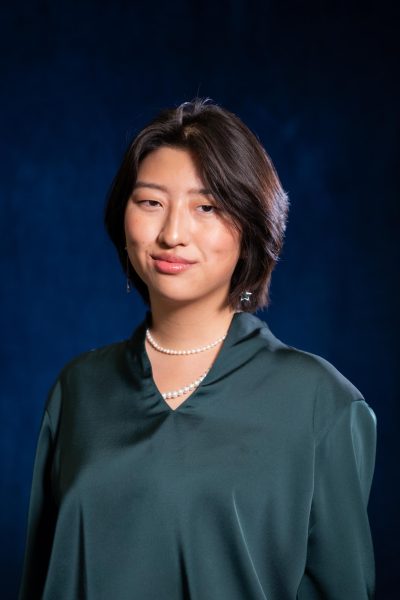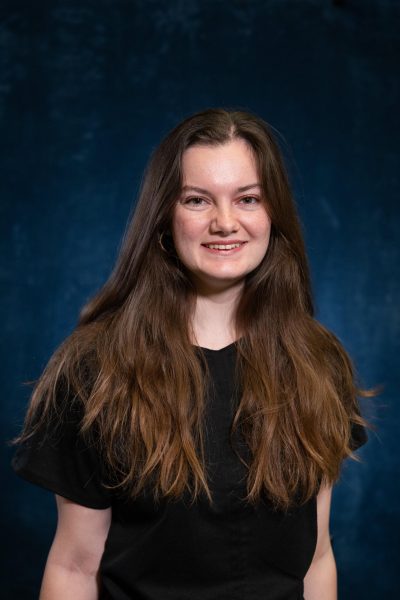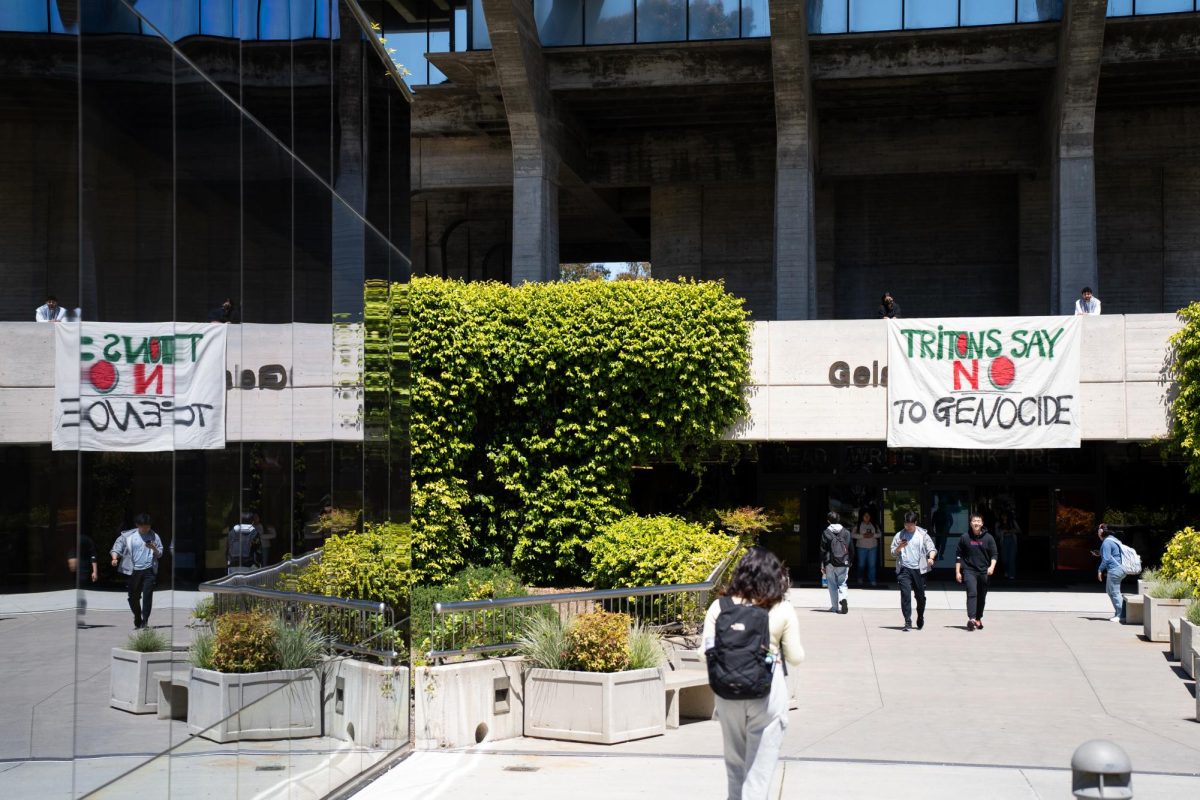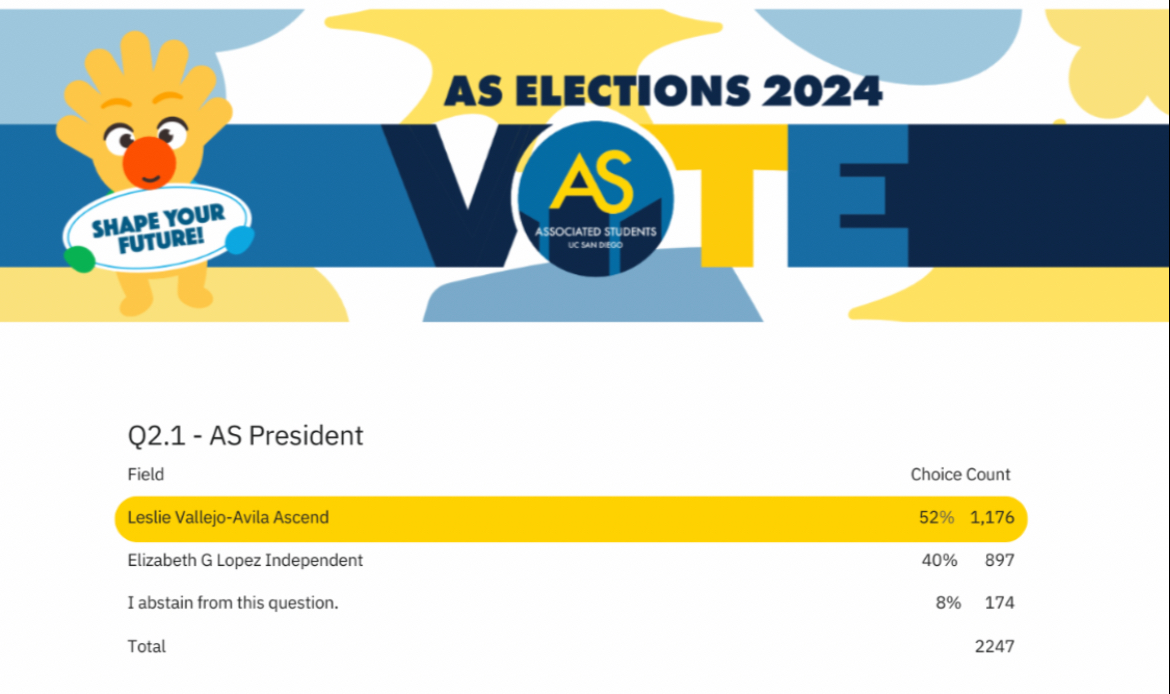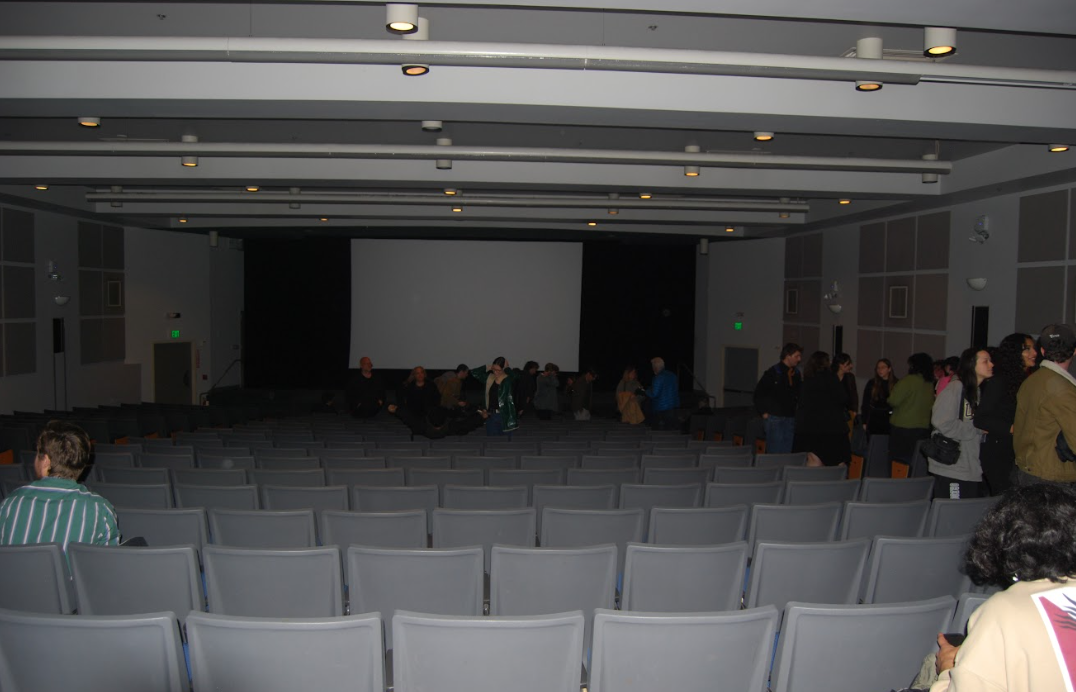Week 5
At their Week 5 meeting on Oct. 27, Associated Students’ senators approved several allocations of Programming Funds for on-campus activities. A.S. also approved several bills, including a resolution to support a new textbook affordability program.
Arts and Humanities Senator Rhianen Callahan began with a committee report. Callahan’s committee is planning on revisiting Graduate Family House Alcohol policy as well as considering designated family parking areas to allow easier moving of car seats and children.
Furthermore, Callahan reported from a meeting that parts of Geisel Library will be under renovation from January 2022 to June 2022.
“They’re going to mainly be renovating the main entrance as well as […] the main waiting room area as well as integrating a bit more services for finding help in one place,” Callahan explained.
Construction will mainly happen on the second floor and the library will provide two side exits during that time. However, all seats should still be available during the construction. Students will receive notifications about it as the process begins.
Then, Campus Wide Senator Tommy Jung reported the student community responses to the first two questions on a student community survey. The survey asked what the student community prioritized in terms of funding and advocacy.
The top four responses to the first question about allocating funds are: food and housing resources, concerts and events, transportation and transformation, and student organizations. For the question asking which areas A.S. should focus its advocacy on, the top three responses were: food and housing resources, health and wellbeing, and student organizations tied with transportation and transformation.
Next, A.S. President Manu Agni further explained the flu vaccine mandate announced on Oct. 8.
“All students, staff, and faculty are required to get the flu vaccine,” Agni said. “However, if you don’t get the flu vaccine, there will be no problem. So, it’s a soft mandate.”
Agni also further explained that following the end of fall break during Week 9, residential students will be required to test upon arrival, while non-residential students won’t have to.
Associate Vice President of Local Affairs Aidan Lin then gave an update on the redistricting in San Diego, saying that there will be a greater push to reach out to students and have them involved in pushing commissioners to listen to the A.S. Office of Local Affairs’ proposed Communities Collaboration Map.
“We’re trying to mobilize more students to support the student cause and trying to get UCSD campus into District 6, along with the off-campus housing that students live in into District 6 as well,” Lin explained.
Lin continued that in a community meeting, he met with other community leaders who drafted together a new citywide map. About the drafted map, he stated, “It focuses on empowering diverse voices of students and communities of color in the city of San Diego… with this map behind us, we’re hoping we can rally students and other community members… onto one map that will empower all of us.”
After this, the legislative committee went on to approve new appointments, which are as shown:
- Michelle Griffith and Xavier Lopez as First Year Senators
- Anna Zick as Transfer Senator
- Daniel Soria as Campus Wide Senator
- Michelle Chow as Off-Campus Senator
- Kristen Eng as Biological Sciences Senator
- Savanna Burney and Jason Metz as Project Directors of the Office of Finance and Resources
- Joseph Guzman and Luke Sztajnkrycer as Financial Analysts for the Office
- Theta Chun as Student Webmaster of the Office of Campus Affairs
- Alexandra Hernandez as Social Media and Marketing Associate for the Office of Environmental Justice Affairs
- Isabel Hui as Programming Director for the Office of Environmental Justice Affairs
- Minju Kim as Outreach Director for the Office of Environmental Justice Affairs
The senators then proceeded to go over budget and fund allocations for organizations on campus associated and not associated with A.S. Below is a brief summary of the budget allocations:
- Student Promoted Access Center for Education and Services (SPACES) — $521,398 (however, due to a mishap from both SPACES and A.S, SPACES did not receive their funding in Week 5.)
- Academic Success Program (ASP) — $84,672
- Student Initiated Access Programs and Services (SIAPS) —$84,672
- Student Sustainability Collective — $253,917
- KSDT — $95,040
- College Councils — $56,160
- UCSA Membership — $95,040
- Alternative Media and Student Services — $202,394
- AS Administrative — $433,985
- Student Life Business Office — $172,220
- University Events Office — $277,427
Office of the President
- Office of the President — $65,000
- Office of Student Advocacy — $2,520
- Office of College Affairs — $79,750
- Office of Academic Affairs — $750
- Office of Food and Housing Resources — $3,400
- Office of Transportation and Transformation — $170,750
Office of Campus Affairs
- Office of Campus Affairs — $170,150
- Office of Concerts and Events — $1,358,500
- Office of Equity, Diversity, and Inclusion — $107,250
- Women’s Commission — $6,500
- Tritons for Equity, Diversity, and Inclusion (TEDI) — $0
- Office of Environmental Justice Affairs — $6,500
- Office of Spirit and Athletics — $92,000
- Office of Health and Well-Being — $29,150
Office of Finance and Resources
- Office of Finance and Resources — $24,750
- Office of Student Organizations — $247,000
- Office of Enterprises and Services — $42,614
Office of External Affairs
- Office of External Affairs — $101,050
- AS Civic Engagement Office — $19,000
- Office of Local Affairs — $45,000
General
- Senator Funds — $14,000
- A.S. Marketing — $27,850
- A.S. Elections — $5,000
- Mandate Reserve Contribution — $146,644.69
- Administrative Supplies and Expenses — $26,830
- Administrative Student Salaries — $153,292.31
- Staff Development — $16,500
- Cabinet Stipends — $108,750
- Senate Stipends — $53,280
- Office of Concerts and Events — $30,870
- A.S. Office of the President — $13,850
- A.S. Office of Campus Affairs — $57,945
- A.S. Office of Student Advocacy — $8,100
- A.S. Office of Finance and Resources — $6,900
- A.S. Office of Student Organizations — $3,250
- A.S. Office of External Affairs — $20,790
- Triton Television(TTV) — $13,800
- All Campus Transfer Association — $3,600
- All Campus Commuter Board – $3,600
- Other Stipends — $2,150
After all of these allocations, the remaining funds will be about $135,143.72. For a more detailed explanation and reasoning for these allocations, please refer to the recording of A.S.’s Week 5 meeting on their Facebook page.
Week 6
A.S. met again for their Week 6 meeting on Nov. 3. The Senate discussed the Student Promoted Access Center for Education and Services (SPACES)’s new budget for the school year, as well as new events and appointments.
The meeting began with a presentation by SPACES leaders on the new SPACES budget.
According to SPACES Director of External Affairs Sophia Sumaray, SPACES repaid A.S. loans using $327,000 worth of rollover funds from last year, then reallocated the rest into SPACES programs.
“Our first point of action, of course, was that we repay our loan back to A.S.,” Sumaray said. “After that, that left us about $287,000, and so the second point of action was that the money was put back into programs that received cuts in the last year.”
$46,000 will be allocated to Students Programs Ignited for Community Engagement & Education (SPICEE). This budget will be put into CORE organizations for cultural and graduation celebrations, such as a gala for CORE organizations.
$13,000 will be given to Student-Initiated Programs for Holistic Retention (SIPHR), which will be focused into events such as ASP Booklending and mentee/mentorship programs.
Finally, the remaining $42,000 will be given to Student-Initiated Access Programs and Services (SIAPS). This money will be given to programs including the summer summit, tours for high schools, and summer conferences.
Then, the A.S. Finance Committee discussed bills in their committee. While an allocation of $340.49 of programming funds to American Chemical Society Student Affiliates has been tabled indefinitely, the approval of the SPACES budget and an allocation of $9,000 to the Office of Concerts and Events was discharged to the Senate.
Further, Earl Warren College Senator Allyson Muir stated that there will be an event coming out to gauge in-person engagement for A.S. events in the future. Muir said that students will scan a QR code to fill out a feedback form about future projects and then spin a wheel for a prize.
Finally, A.S. will collect information and suggestions on increasing mask-wearing compliance, especially in Geisel Library, as well as reducing the number of offensive sticky note messages on dorm windows. Vice President Isaac Lara suggested getting house advisors and resident assistants can help communicate to students to be conscious of what they’re posting on their windows.
“I feel like if the campus were to do it, it would feel like [a] very ‘teacher-telling-student’ way,” Lara said. “[Whereas] if an RA or HA does it, it’s like ‘I know it’s funny but it might offend some people.”
However, Eleanor Roosevelt College Senator Isabella Ramos, who is an RA, says that from personal experience, residents have been dissident or unresponsive.
“As much as I want to say they listen to us, they don’t listen to us unless we report them,” Ramos explained.
In terms of mask compliance in the library, Senator Rosario suggested library workers can patrol the library to watch for people who are not masked.
“For those people who aren’t wearing masks, maybe [give] a… first warning and then a second warning that they could be blacklisted,” Rosario said.
Lara also reminded that marketing promoting mask-wearing has been successful when it emphasizes conscious decision making.
“The most successful example is the one asking to be conscious of where you’re going, being considerate of the people you’re going to see,” Lara explained. “So, more subtle — not guilt-tripping — like giving them points like ‘if you’re going to make these decisions, recognize how important they could be.”
A.S. Council meetings happen at 6 p.m. every Wednesday and are accessible to students. Students can join in by using their Zoom link or tuning in on Facebook Live.
Image by Ava Bayley for The UCSD Guardian



